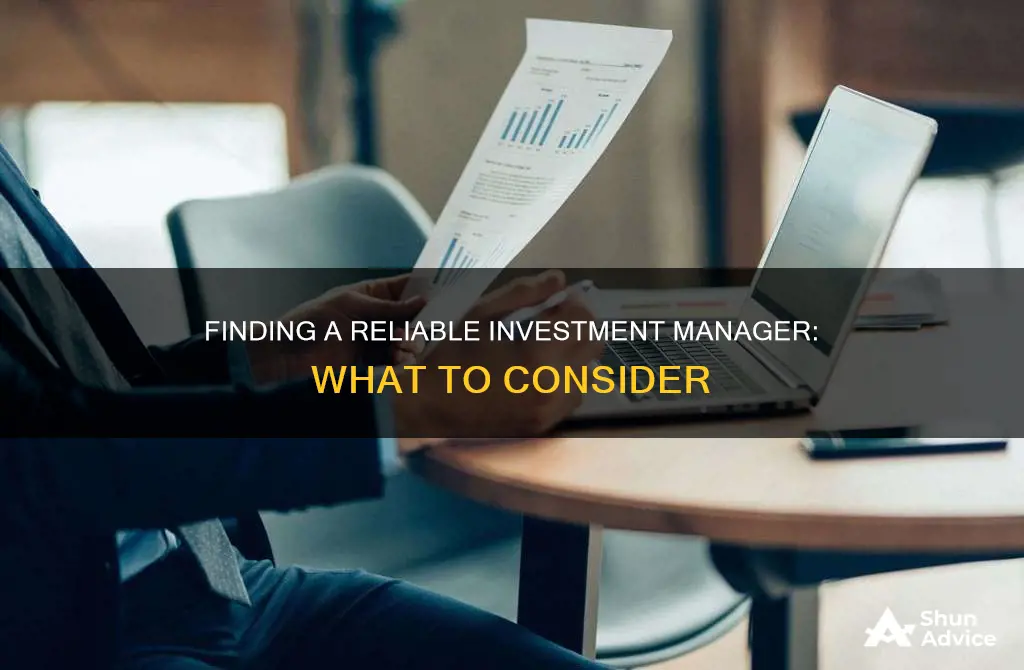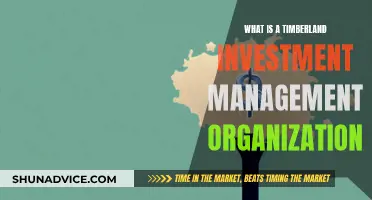
Finding an investment manager that suits your needs can be a complex and time-consuming process. Here are some key considerations to help you get started:
- Identify your financial needs: Are you looking for help with investment strategies, debt management, tax planning, retirement planning, or estate planning? Knowing what specific services you require will help you find an advisor with the right expertise and specialisations.
- Understand the different types of advisors: Financial advisors go by many names, including investment advisors, brokers, financial planners, financial coaches, and portfolio managers. Some common types include fee-only advisors, fee-based advisors, commission-based advisors, registered investment advisors, and robo-advisors.
- Credentials and expertise: Look for advisors with relevant credentials and expertise that align with your needs. For example, a Certified Financial Planner (CFP) or a Registered Investment Advisor (RIA) who is bound by fiduciary duty.
- Investment philosophy and strategy: Ensure you understand the advisor's investment philosophy and how they plan to grow and manage your portfolio. Make sure their approach aligns with your risk tolerance and financial goals.
- Fee structure: Different advisors have different fee structures, such as percentage-based fees, flat fees, or hourly rates. Understand the costs involved and evaluate if the benefits and value received are worth the fee.
- Additional services: Consider the broader financial ecosystem and any additional services you may need, such as cash flow planning, tax mitigation, estate planning, or financial planning.
- Research and due diligence: Take the time to research and evaluate potential investment managers. Look into their credentials, performance track record, investment history, processes, operations, personnel, investment options, and terms of the relationship.
- Minimum requirements: Many private investment and wealth management firms have minimum requirements for investible assets, typically around $1,000,000. Ensure you meet these requirements before proceeding.
| Characteristics | Values |
|---|---|
| Credentials and Expertise | Certified Financial Planner (CFP), Certified Wealth Strategist (CWS), Certified Trust and Fiduciary Advisor (CTFA) |
| Investment Philosophy | Clear and concise investment philosophy that aligns with your approach to managing your finances |
| Fee Structure | Percentage-based fee structure, flat-fee or hourly rate |
| Additional Services | Cash flow planning, tax mitigation, estate planning, trust and estate services, financial planning |
What You'll Learn

Understand the different types of financial advisors and their credentials
When looking for an investment manager, it's important to understand the different types of financial advisors and their credentials. While "financial advisor" is a general term, there are several types of financial advisors with different qualifications and areas of expertise. Here are the most common types of financial advisors:
Investment Advisors
Investment advisors provide investment advice to clients and can also manage their assets directly. They are legally required to register with the SEC or state regulators, depending on the assets under management. These advisors often go by titles such as investment advisers, brokers, financial planners, or portfolio managers.
Certified Financial Planner (CFP)
CFPs have met rigorous training and experience requirements set by the CFP Board. They must pass a certification exam and adhere to high ethical standards. CFPs have a fiduciary duty to their clients, meaning they are obligated to act in their client's best interest.
Financial Consultant
Financial consultants is a general term, but some hold the Chartered Financial Consultant (ChFC) designation. ChFCs have completed similar education requirements to CFPs and are held to a fiduciary standard. They must also adhere to a code of ethics.
Robo-Advisor
Robo-advisors are automated investment services that use algorithms to create and manage investment portfolios based on an individual's goals and risk tolerance. They are a low-cost option, often charging around 0.25% of assets under management.
Wealth Manager
Wealth managers provide holistic financial advice to high-net-worth individuals, particularly in areas such as investment management, financial planning, estate planning, and tax planning. They often work with clients who have significant investable assets and may charge fees based on a percentage of assets under management.
Portfolio Manager
Portfolio managers focus on managing their clients' investments and investment-related issues. They select investments, decide when to sell, and may help with strategies such as tax-loss harvesting. Some portfolio managers hold designations such as Chartered Financial Analyst (CFA). However, they may not always act as fiduciaries.
It's important to note that financial advisors can have different credentials and designations, and it's essential to research and understand the specific qualifications of any advisor you consider working with.
Building a Solid Investment Portfolio: RIA Strategies
You may want to see also

Know what services you need
Knowing what services you need is a crucial step in finding an investment manager. Here are some key points to consider:
Understand Your Financial Needs and Goals
Before seeking an investment manager, it's essential to clearly define your financial needs and goals. Are you seeking help with retirement planning, investment strategies, debt management, tax planning, or something else? Different investment managers have different areas of expertise, so understanding your specific needs will help you find a manager well-suited to meet them.
Determine the Level of Specialisation Required
Investment managers may offer either holistic financial help or specialised services. If you require assistance with various financial aspects, such as budgeting, savings goals, retirement planning, and estate planning, a holistic financial planner would be ideal. On the other hand, if you have more complex or specific needs, such as debt management or tax strategy, you may benefit from working with a specialist in that particular field.
Identify Any Additional Services Required
Investment managers often provide additional services beyond investment advice. These may include insurance recommendations, cash flow planning, tax mitigation, estate planning, financial planning, and more. If you anticipate needing any of these services, look for investment managers who can offer a comprehensive package that addresses your unique financial needs.
Evaluate the Investment Manager's Philosophy
Understanding the investment manager's philosophy is crucial. Their philosophy outlines their approach to managing your funds and the factors they consider when making decisions about your portfolio. Ensure that their philosophy aligns with your financial goals and risk tolerance, and don't hesitate to ask questions until you fully comprehend their proposed strategy.
Communicate Your Expectations Clearly
When selecting an investment manager, it's essential to communicate your expectations clearly. Let them know what specific services you require and any unique financial goals you have. This will help ensure that the investment manager is well-suited to meet your needs and can provide the level of service you require.
In summary, finding the right investment manager starts with a clear understanding of your financial needs, goals, and expectations. By defining these aspects, you can more effectively evaluate potential investment managers' expertise, specialisations, and service offerings. Remember to ask questions, communicate openly, and ensure that their philosophy and strategies align with your financial objectives.
Investment Management: Adding Value, Growing Client Wealth
You may want to see also

Research their background and credentials
The term "investment manager" is often used synonymously with other titles such as "financial advisor". However, it's important to note that there are specific differences between the two when it comes to managing your finances.
Professionals in this field generally hold various credentials to prove their expertise in investment management and other aspects of finance, such as being a Certified Financial Planner (CFP), Certified Wealth Strategist (CWS) or Certified Trust and Fiduciary Advisor (CTFA).
When performing your due diligence, make sure to research any potential investment manager to confirm their credentials using professional directories such as FINRA's BrokerCheck tool or the Security and Exchange Commission's (SEC) Investment Advisor Public Disclosure website.
Similarly, make sure their expertise aligns with your needs, both by reviewing their job title and any expertise signals you can find about them online (such as a profile on the firm's website with details on their areas of focus).
Not all financial advisors are licensed or certified, and you can verify their credentials through a number of organisations, such as the Certified Financial Planner (CFP) Board of Standards.
No matter what title, designation, certification or license an advisor claims to have, it's on you to vet the advisor's credentials and experience. Always verify any credentials they claim to have and check to see if they've had any disciplinary problems such as fraud.
You can research an advisor's background by looking up their Form ADV before you agree to work with them. You can also review an advisor's employment record (and look for red flags like disciplinary actions) on FINRA's BrokerCheck website.
A fiduciary financial advisor may charge an hourly rate, a flat fee, or a percentage of the assets under management. A non-fiduciary advisor may get paid commissions for recommending specific financial products.
A fiduciary advisor is committed to acting in the best interests of the client in making investment recommendations. A non-fiduciary advisor has the less onerous responsibility of recommending investments that are appropriate for the client. Fiduciary advisors hold certifications such as certified financial planner (CFP) or accredited investment fiduciary (AIF). Fiduciary advisers typically charge their clients fees but do not accept sales commissions.
Understanding Minimum-Variance Portfolio Investment Proportions
You may want to see also

Understand their fee structure
Understanding the fee structure of an investment manager is a critical aspect of choosing the right one for your financial goals. Here are some key considerations to help you navigate the fee structures of investment managers:
Percentage-Based Fee Structure:
Some investment managers charge a percentage of the assets under their management (AUM). This fee is typically calculated as a percentage of the total value of your investment portfolio that they manage on your behalf. The average AUM fee is just over 1%, but it can vary depending on the size of your account. Smaller accounts may be subject to higher fees, often up to 2% per year. It's important to note that your AUM fee will fluctuate with the value of your investments, so be prepared for adjustments.
Performance-Based Fee Structure:
Another variation of the percentage-based fee is a performance-based fee, where the investment manager charges a percentage of the total return generated by your portfolio or the excess return over a specific benchmark. This structure incentivizes the manager to aim for higher returns.
Flat-Fee or Hourly Rate Structure:
Some investment managers may charge a set fee for their services, either as a flat fee or an hourly rate. This structure is less common than percentage-based fees, but it can be advantageous if you prefer predictability in your costs.
Understanding the Value:
When evaluating fee structures, it's essential to consider the value provided by the investment manager. Weigh the cost against the benefits you receive, such as increased portfolio growth, reduced risk, or additional services. The key is to find a balance between the fees you pay and the value you gain from their expertise and services.
Fee Structures of Different Types of Advisors:
It's worth noting that different types of financial advisors may have varying fee structures:
- Fee-Only Advisors: These advisors charge only for their services and don't earn commissions from investment products. They often charge a percentage of assets under management, a flat annual fee, or an hourly rate.
- Commission-Based Advisors: These advisors typically advertise their services as free but earn commissions from the investment or insurance products they sell to you.
- Fee-Based Advisors: Fee-based advisors charge fees and also earn commissions on the products they recommend. Their fees may be based on a percentage of assets under management or through hourly rates, flat fees, or retainer agreements.
- Registered Investment Advisors (RIAs): RIAs can be fee-only or fee-based and are typically paid through annual account fees or a percentage of assets under management.
- Robo-Advisors: These are low-cost, automated online platforms that usually charge a flat annual or monthly fee or a percentage of your invested assets.
Additional Considerations:
When reviewing fee structures, be sure to ask about any potential hidden costs or additional fees that may apply. Also, consider the frequency of payments, whether they are billed monthly, quarterly, or annually. It's essential to have a clear understanding of the total cost of the investment manager's services to make an informed decision.
Investing Young: Better Than Saving?
You may want to see also

Ask key questions
When choosing an investment manager, there are several key questions to ask to ensure that they are the right fit for you and your financial goals.
Firstly, it is important to understand the different credentials and areas of expertise of the investment manager. Ask them about their qualifications and whether they are a fiduciary. A fiduciary is committed to acting in the client's best interest. Some common qualifications include Certified Financial Planner (CFP), Certified Wealth Strategist (CWS), and Certified Trust and Fiduciary Advisor (CTFA). It is also important to ensure their expertise aligns with your needs.
Secondly, ask them about their investment philosophy and how they plan to grow and manage your portfolio. Ensure that you understand their proposed strategy and that it aligns with your financial goals and risk tolerance.
Thirdly, ask them about their fee structure and how they will bill you for their services. Investment managers may charge a percentage-based fee, a flat fee, or an hourly rate. Understand the cost of their services and evaluate whether the benefits and value received are worth the cost.
Finally, ask about any additional services they provide. Investment managers may be part of a larger firm that can offer other financial services such as tax mitigation, estate planning, or financial planning. Understanding the full range of services they offer can help you make an informed decision.
Other important questions to ask include:
- What types of clients do they typically work with?
- How often will you meet and communicate?
- Are there any potential conflicts of interest?
- Will you work directly with the investment manager or someone else in their firm?
Investment Manager: Licenses Required to Manage Money
You may want to see also
Frequently asked questions
You may need an investment manager if you require help with specific services such as investment and planning, tax strategies and advisory, accessing complex investment vehicles, estate planning and cash flow analysis. You may also benefit from an investment manager if you don't feel confident in your ability to manage your funds, or if you want new perspectives on your existing financial strategy.
You can find an investment manager by visiting the website of the National Association of Personal Financial Advisors (NAPFA) or using the Certified Financial Planner (CFP) Board of Standards tool. You can also seek recommendations from friends and family, or ask for a referral from a professional such as your accountant or attorney.
You should look for an investment manager whose credentials and areas of expertise align with your needs. They should have a clear and concise investment philosophy that you understand and agree with. It's also important to consider their fee structure and the effects it will have on your portfolio.
You should ask them about their services, areas of specialty, investment philosophy, total cost, professional experience, licenses or certifications, disciplinary history, types of clients, and communication methods.







